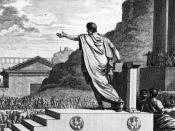Why Might the tribunate of Gaius Gracchus be considered a "constitutional challenge" to Roman government?In Gaius' first year of tribunate he introduced a number of political, economical and judicial reforms to which sparked massive opposition in the senate as well as throughout the entire roman government. Gaius' tribunate was never intended to bring about change, it was intended to protect the ordinary citizen from being unjustly treated by the magistrates. However, the Gracchi showed the way that the tribunate could be used as an instrument for change. They used it to undermine the traditional powers of the senate and revealed the potential for ambitious men to promote their own political careers.
The first judicial law passed by Gaius intended to transfer the power of the courts from the Senators to the equestrian class. According to Appian, the senate were now "subjects" , the equites were rulers and "political mastery was turned up side down."
Gaius remarked once this law was passed that he has "broken the power of the senate once and for all" . The new force in Roman politics was the wealthy but previously insignificant equites.
Gaius then proposed a massive road building scheme that was designed to improve transport, employment, improve supplies and thus improve communication. This would also have advantages for Gaius as it would put "a multitude of contractors and artisans under obligations to him" and thus made his cliental larger. These services won him the devotion of the people and was easily re-elected in 122 BC.
Gaius, on top of reaffirming Tiberius' lex agaria, introduced the lex frumentaria (corn law) which fixed the price of grain and fulfilled the same role that the lex agraria had in that it gained support for Gaius from the public. This was a threat to the government as...


